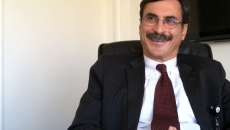Telehealth
There it was -- the clear-as-a-bell prediction. Call it the "wow factor." Andrew Watson, MD, medical director of the Center for Connected Medicine at UPMC, made an assertion about the future of digital health at the mHealth Summit on Dec. 9 that sent a hushed "wow" rippling across the room.
The numbers do the talking. There are 110 million sexually transmitted infections among women and men nationwide, with 20 million new STIs reported each year. New mobile health innovations, however, are seeking to bring these numbers down, big time.
The mHealth Alliance plans to transition its base of operations in 2014 from the United Nations Foundation in Washington, DC to South Africa. In the coming months, the Alliance will finalize a full transition plan for 2014, including a proposal to co-locate with the Johannesburg-based Praekelt Foundation.
The Mount Sinai Health System in New York City will create the Mount Sinai Institute of Technology with $5 million in funding from the New York City Economic Development Corporation. The goal is to radically transform biomedicine through technology-based solutions.
In a joint letter to the House Ways & Means and Senate Finance Committees, several industry groups have implored legislators to incentivize integration between electronic health records and remote patient monitoring, to spur better use of patient-generated data in payment reform efforts.
IEEE Standards Association and Continua Health Alliance have signed a strategic agreement to help accelerate and broaden the adoption of globally relevant standards-based technologies for the healthcare arena. The idea is to enable widespread market implementation of end-to-end, plug-and-play personal medical devices.
The Electronic Health Record Association, which represents 40 EHR developer companies whose products are in use at a majority of hospitals and physician practices today, tells the FDA that EHR systems should remain unregulated by the agency.
The health IT hazard that tops the ECRI Institute's top hazards list for 2014 is a recurring one, having been singled out by many safety organizations as something to beware.
Residents of New Hampshire and Vermont can count on quicker response to signs of a stroke with a new telestroke program launched by Dartmouth Hitchcock Medical Center and Mayo Clinic. The program provides 24/7 access to telestroke specialists via videoconferencing technology.
David Levin, MD, CMIO at Cleveland Clinic in Cleveland, Ohio, discusses the challenges with meaningful use, data exchanges and the lack of "human factor" in health IT.
